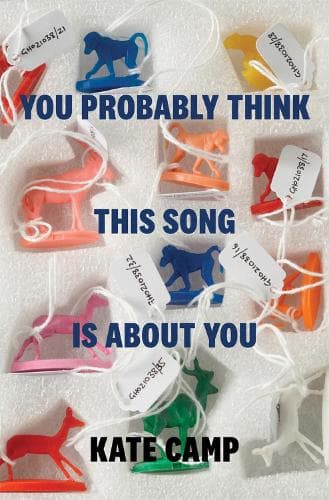You Probably Think This Song Is About You
Reviewed by Linda Herrick
Author:Kate Camp
Publisher:Te Herenga Waka University Press
ISBN:9781776920129
Date Published:14 July 20Many former residents of Wellington will remember its coldness, especially if they lived on the dark side of the city’s famous valleys and vales. Poet Kate Camp’s collection of memoir-essays, in which the capital provides the backdrop as a shabby host, offers a friendlier perspective of the city.
Despite that, it’s a survey of a life that, in its brutal self-reflection, makes you grieve for its subject. Camp the Younger was the girl who struggled to grow up, clinging stubbornly to immaturity, excess and self-absorption. Named after You’re So Vain, Carly’ Simon’s ode to narcissism, it may shock those who know of Camp as the poet, so eloquent, so very sensible.
The Kate we meet in the book, from her early childhood into her so-called adult years – she is now 50 – presents us with a raw litany of astoundingly risky behaviour during the late 1980s - 90s. Wellington, back in those days, was kind to Camp as she negotiated the streets late at night. An ‘out-of-it girl’ like her probably wouldn’t survive in today’s more predatory environment.
Her narrative is not so much a walk down memory lane than a stagger between blackouts, bad boyfriends and self-loathing as she searched for that place called rock-bottom. In her experience, she writes, rock bottom is “a place where you end up going to over and over again. If you’re lucky, you learn something each time you visit.”
She did a lot of learning. The reader may feel sympathy, laugh and wince, often all at the same time. An early chapter, for instance, is titled, I wet my pants, a raw confessional. Children wet their pants, like little Kate when she was doing it outside shops or on school trips when she was six. Six is quite old but it gets worse. She was in her 30s when she had a fairly ordinary night out, drinking and smoking before she made a careful return to her flat. “When I woke, I’d wet the bed and the electric blanket was still on full.”
Camp’s more comforting memories emerge when she re-engages her child’s eye, recalling Grandma and Grandpa’s house in Hastings, the plates and biscuit tins, the quilt she now owns. She longs for the scent of Grandma’s soap, Knights Castile. But nostalgia can work the other way.
The chapter A packet of Benson & Hedges and a box of matches explores the generational allegiance to cigarettes, certainly a parental trait many of us inherited, with the vast range of cigs on sale, the lighters, the ritual of the rollies. To many of us, cigarettes embody a curse. In Camp’s analysis, smoking meant wanting something – and getting it. When she didn’t want it any more, it would not go away.
As for the usual adolescent fumbles of alcohol and a raging dope habit, mixed up with sex and shame, Camp’s truth-sharing is more than generous as she writes of the first time she had sex, when she was 14; her first “drinking injury” or when she was sexually assaulted with a bottle of Chardon.
Her writing assumes a hallucinatory hue: the hangovers, “the yellow bile... the primary colours,” the sick stuck in her hair.
Of course she chose her boyfriends unwisely, wasting a decade on an abusive co-dependency refining “tired rituals of attraction and contempt.” Her quests for love were as fruitful as her jobs, including a desperate two-year period of canvassing for Greenpeace, knocking on an estimated 50,000 doors.
How did she keep going? There seems to be a deep inner core of stability, sustained by her love for her parents, Michael Camp and Elaine Lynskey, and her sister Mary.
But where were they when her life was unravelling? Or is it possible that she was able to hide behind a facade of control? “It’s not easy for my parents to read a book like this,” she writes at the end. “I hope it’s obvious that I love them very much.”
It’s an immense relief to read that Camp has married a man, Paul Mulrooney, she met via a dating website. She met him after dating 11 guys, searching for “a Kennedy cabinet type ... geeky guys who know a lot.” It’s such a sweet thing that Mulrooney, a former Masterminder whose subject was Presidents of the US, with his backup subject Watergate, married Camp, obsessed with the same subjects.
They, with Camp’s mother, spent the end of the 2016 presidential election campaign, staying in the Watergate, a fitting finale to a memoir that deals with disasters, great and small. Mulrooney has helped her, she writes, find the courage to go back to some of these memories. Courage is also needed to read Camp’s account because, as she knows, some of us will be thinking “this song is about you.” Excruciating and rewarding, yes; and, sometimes, a little too close to home.
Reviewed by Linda Herrick
